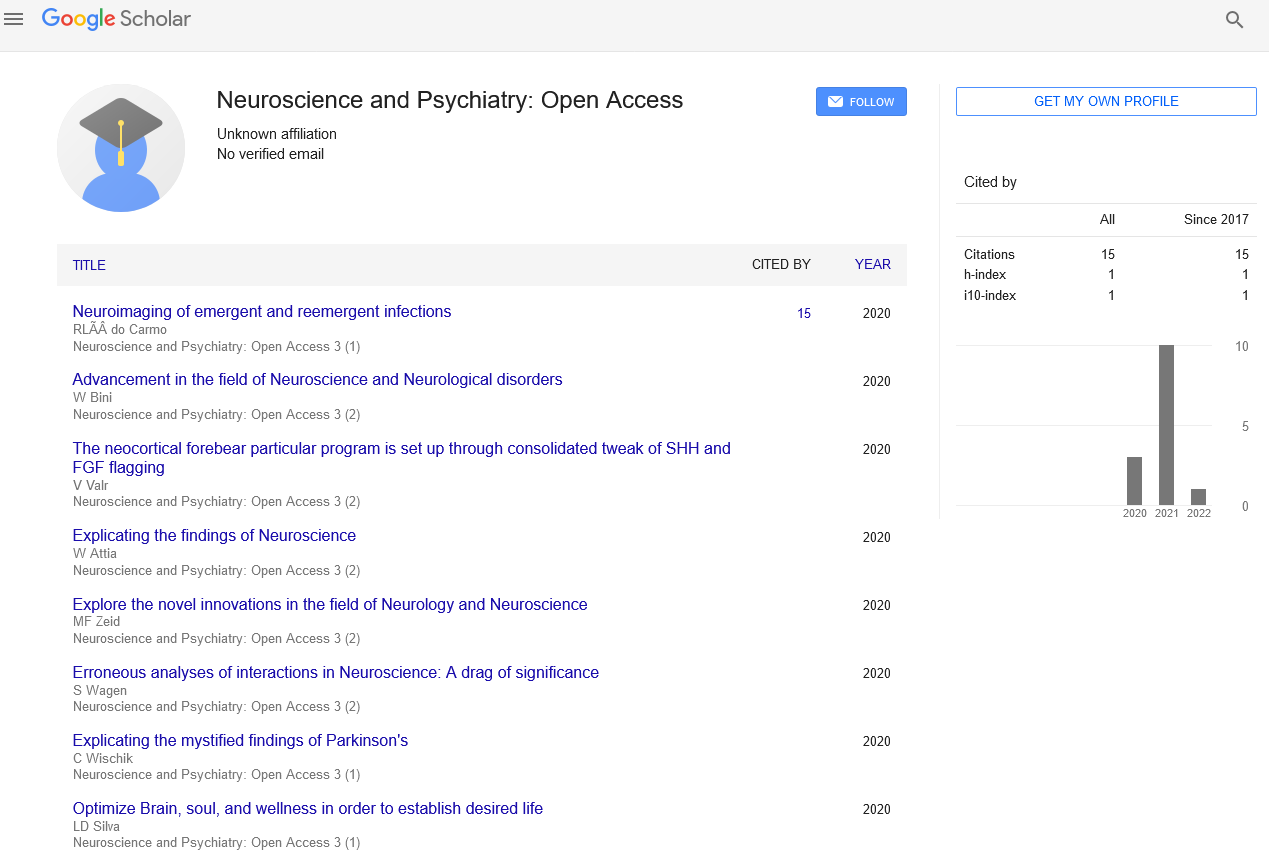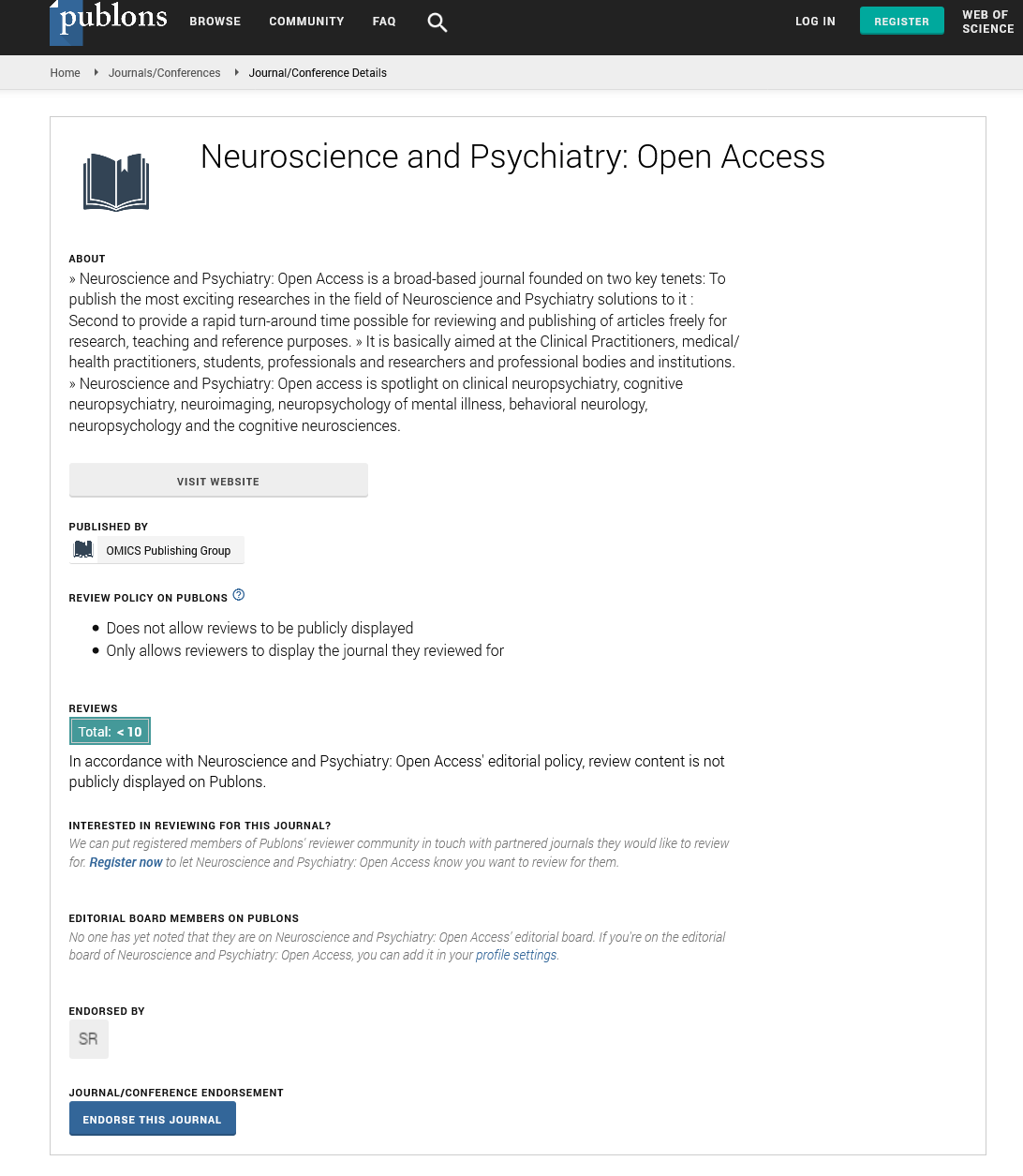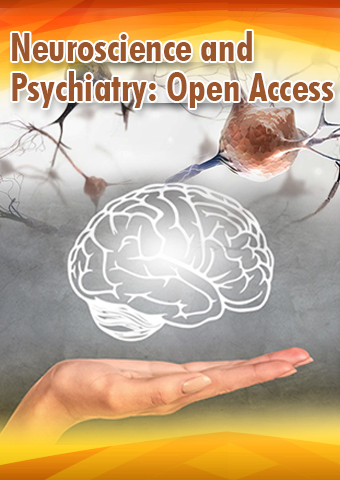Perspective - Neuroscience and Psychiatry: Open Access (2024) Volume 7, Issue 1
Nutrition and Neuroscience: The Intricate Connection Between Diet and Brain Health
- Corresponding Author:
- Dinesh Bhugra
Department of Neuroscience, University of Cambridge, Cambridge, UK
E-mail: mmo123@stanford.edu
Received: 02-01-2024, Manuscript No. NPOA-23-119206; Editor assigned: 05-01-2024, PreQC No. NPOA-23-119206 (PQ); Reviewed: 19-01-2024, QC No. NPOA-23-119206; Revised: 30-01-2024, Manuscript No. NPOA-23-119206 (R); Published: 07-02-2024, DOI: 10.47532/npoa.2024.7(1).162-164
Introduction
The intricate relationship between nutrition and neuroscience underscores the profound impact that our dietary choices have on brain health and function. It has long been recognized that the brain, as one of the body’s most metabolically active organs, is highly sensitive to the nutrients it receives. This article explores the pivotal role of nutrition in neuroscience, shedding light on the effects of various dietary components on cognitive function, mental well-being, and overall brain health.
The human brain is a metabolic powerhouse, accounting for about 20% of the body’s total energy consumption. This high energy expenditure is necessary to support a wide range of crucial processes, including neuronal signaling, neurotransmitter synthesis, and maintenance of ion gradients. As such, the brain relies heavily on a constant supply of energy and the Blood-Brain Barrier (BBB) is a protective barrier that separates the circulatory system from the brain. It allows for the selective passage of molecules, ensuring that only essential nutrients, oxygen, and metabolic substrates can reach the brain. The BBB helps maintain the brain’s unique biochemical environment and protects it from harmful substances.
Description
Macronutrients
Carbohydrates
• Glucose, derived from carbohydrates, is the primary energy source for the brain.
• Complex carbohydrates, such as whole grains, provide a steady supply of glucose, supporting
sustained cognitive function.
• The Glycemic Index (GI) of carbohydrates can influence cognitive performance, with high-GI foods leading to rapid fluctuations in blood sugar levels, potentially affecting focus and
concentration.
Fats
• Fats are essential for the brain’s structure and function, comprising a significant portion of
its cell membranes.
• Omega-3 fatty acids, found in fatty fish, flaxseeds, and walnuts, play a crucial role in
maintaining cognitive function and reducing the risk of neurodegenerative diseases.
Proteins
• Amino acids from dietary proteins are essential for neurotransmitter synthesis.
• Tyrosine, found in proteins, serves as a precursor for dopamine, a neurotransmitter involved
in mood regulation.
• Tryptophan, another amino acid, is the precursor to serotonin, a neurotransmitter associated
with feelings of well-being.
Micronutrients
Antioxidants
• Antioxidants, such as vitamins C and E,
selenium, and beta-carotene, protect brain
cells from oxidative stress, which is implicated
in neurodegenerative diseases.
• A diet rich in fruits, vegetables, and nuts
provides an abundance of antioxidants.
B vitamins
• B vitamins, including B6, B9 (folate), and
B12, are essential for brain health.
• Folate is crucial for DNA synthesis and
repair, and its deficiency is associated with
cognitive decline.
• B12 is vital for the development and
maintenance of nerve cells.
Minerals
• Essential minerals like zinc, iron, and
magnesium are critical for neurotransmitter
synthesis, cognitive function, and
maintaining healthy brain structure.
• Iron deficiency can lead to cognitive
impairment and reduced attention span.
Phytonutrients
Polyphenols
• Polyphenols are plant compounds with
antioxidant and anti-inflammatory properties.
• They can be found in foods like berries,
dark chocolate, and green tea and have been
associated with improved cognitive function
and reduced risk of neurodegenerative
diseases.
The gut-brain connection
Emerging research has highlighted the gut-brain connection, a bidirectional communication pathway between the gut and the brain. The gut microbiome, a diverse ecosystem of microorganisms in the digestive tract, plays a significant role in this connection. Several key points are worth noting:
Microbiota and mental health
• The gut microbiota can influence mental
health and well-being through the gut-brain
axis.
• Dysbiosis, an imbalance in gut bacteria, has
been linked to conditions such as anxiety,
depression, and even neurodegenerative
diseases.
Dietary impact
• Diet plays a crucial role in shaping the
composition and diversity of the gut
microbiome.
• A diet high in fiber, prebiotics, and probiotics
supports a healthy gut microbiota, potentially
leading to improved mood and cognitive
function.
Short-Chain Fatty Acids (SCFAs)
• Gut bacteria ferment dietary fibers to
produce Short-Chain Fatty Acids (SCFAs),
which can have neuroprotective effects.
• SCFAs like butyrate can promote brain
health and reduce inflammation.
Diet and brain development
The impact of nutrition on the brain extends to its development, particularly during critical periods such as fetal development and infancy. Proper nutrition during these phases is crucial for building a healthy brain. Key considerations include:
Maternal nutrition
• Maternal nutrition during pregnancy
influences fetal brain development.
• Nutrients like folate, iron, and omega-3
fatty acids are essential for the development
of the fetal nervous system.
Early nutrition
• Breast milk is an ideal source of nutrition
for infants, providing essential nutrients for
brain development.
• Adequate intake of Docosahexaenoic Acid
(DHA), an omega-3 fatty acid found in
breast milk and some infant formulas,
supports cognitive development.
Challenges and dietary considerations
• Dietary disparities: Socioeconomic disparities
can significantly impact access to nutritious
foods, potentially leading to dietary
inadequacies that affect brain health.
• Addressing these disparities is crucial to
ensure equitable access to nutritious foods
and promote brain health for all.
• Besity and a high-calorie, high-sugar diet
have been associated with adverse effects on
cognitive function and an increased risk of
neurodegenerative diseases.
• Maintaining a healthy weight through
balanced nutrition is essential for preserving
cognitive health.
Mental health disorders
• Mental health conditions, such as eating
disorders, can have a profound impact on
dietary habits and nutrition.
• Integrated approaches that address both
mental health and nutrition are necessary to
support individuals with these conditions.
Conclusion
The connection between nutrition and neuroscience underscores the profound impact of diet on brain health and function. A well-balanced diet, rich in essential nutrients, antioxidants, and healthy fats, is essential for supporting cognitive function, maintaining mental well-being, and reducing the risk of neurodegenerative diseases.
Moreover, the gut-brain connection highlights the role of the gut microbiome in influencing mental health, further emphasizing the importance of diet in brain function. Recognizing the significance of nutrition in neuroscience offers opportunities to improve brain health throughout the various stages of life, from fetal development to aging. By making informed dietary choices, we can harness the power of nutrition to protect and enhance our most vital organ the brain.


